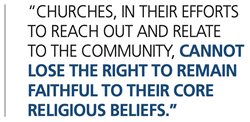Dear Friend,

Does your church rent out its facilities to non-church individuals and groups?
Many do. It’s one way for churches to reach out into their communities and to serve their neighbours as part of their broader religious mission.
By opening their doors to non-church groups, churches all across Canada have contributed to community development efforts in significant and beneficial ways. For example, access to affordable spaces enables not-for-profits to deliver many valuable community programs (like addiction support, homeless ministries, art displays, children/seniors’ activities, etc.).
And whatever you do, whether in word or deed, do it all in the name of the Lord Jesus (Col 3:17)
Community outreach is a crucial part of a church's mission to be “salt and light” to those around them. As such, our work cannot just be about responding to requests from the communities we seek to serve – the work must also be encompassed by (and reflective of) the work and teachings of Jesus Christ.
When a church rents out its space, the facilities do not cease to be a part of the church’s space dedicated to religious purposes. Under human rights codes, church-owned facilities, unlike public spaces, are allowed to set reasonable faith-based restrictions on what activities are acceptable on their premises. As such, a church is not obligated to rent out its facilities for activities that would challenge or undermine the church’s mission, beliefs and values.
Star of the Sea Community Centre, located in White Rock, British Columbia, is owned and operated by a Catholic parish. The parish allows groups outside of the Catholic community to rent its facilities, but only as long as the premises are not used for any purpose that is contrary to the teachings of the church.
For this reason, the Community Centre had denied an application from the White Rock Pride Society to host a fundraising event. The Pride Society’s promotion and celebration of same-sex intimacy and marriage were deemed to be in conflict with the church’s stance on sexual abstinence outside the sacred bond of marriage and on the sanctity of the marriage covenant between one man and one woman.
In June 2019, the Pride Society filed a complaint with the BC Human Rights Tribunal, citing discrimination on the basis of sexual orientation.

The church sought to get the complaint dismissed by denying any discriminatory conduct. They reasoned that the denial of the rental application was justified on the basis of their constitutionally protected right to freedom of religion. To compel the church to host the event would be forcing the church to act in a manner that contradicts the moral teachings of their faith. This is in clear violation of Section 2(a) of the
Charter which guarantees protection of freedom of conscience and religion.
Unfortunately, the church was not able to get the complaint dismissed.
Provincial human rights tribunals are being asked with increasing frequency to hear claims of this nature. On one side, members of the LGBTQ+ community are claiming the right to be free from discrimination based on sexual orientation. On the other side, religious individuals and organizations are claiming the right to be free from being compelled to affirm societal norms that contradict their faith.
In a secularized society, there is growing concern among the religious minority that human rights protections may no longer be applied in a way that proportionately balances the rights of both sides.
The EFC is seeking to intervene in this case. We have a long track record of advocating for and defending religious freedom and religious equality in Canada, not only for the benefits of Canadian Evangelicals, but for all Canadians.
We believe that the ability of church-owned facilities to apply faith-based restrictions on acceptable activities is an important religious freedom that must be protected. It is unreasonable, not to mention unjust, to demand that churches set aside their beliefs when interacting with the wider community.
Churches should not be forced to act contrary to their convictions, or to contradict their beliefs with their actions, as the price of public participation. Above all, they are to be faithful to their calling.
The result of these hearings will have a profound effect on the freedom and the equal opportunity of Christians and other religious minorities to participate in public life.
Churches, in their efforts to reach out and relate to the community, cannot lose the right to remain faithful to their foundational religious beliefs (Psalm 11:3). That’s what’s at stake in this case. Will you add your voice to make a positive impact on the upcoming hearings?
Please make a generous gift today! Thank you!
Sincerely,
Bruce Clemenger
President